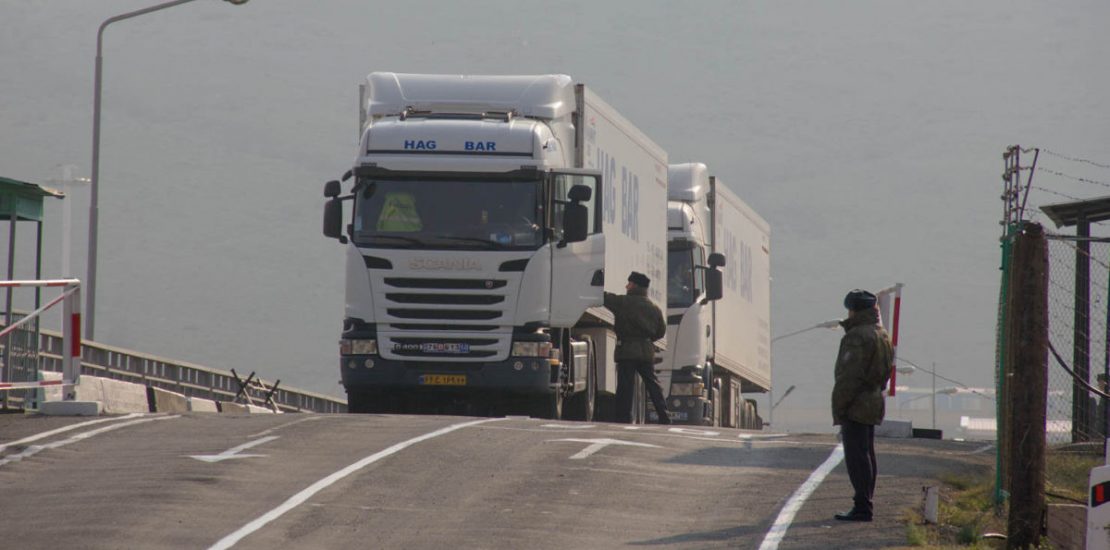- 13 September, 2021
- Foreign Policy

After the 44-day war in 2020, Azerbaijan not only continues to resort to provocations and destabilizing actions in its relations with Armenia, but also tries to create problems for other countries in the region.
What
Since September 12, on the Vorotan section of the Goris-Kapan highway (which is used by the Armenian side but controlled by the Azerbaijani side), the Azerbaijani police have been stopping and checking (or charging a road tax) the drivers of trucks with Iranian license plates for “entering the territory of Azerbaijan”.
The Armenian public learned about this from the September 12 press release issued by the National Security Service of the Republic of Armenia. According to the press release, “Azerbaijani police have been inspecting Iranian trucks since September 12, starting at 12:00, and the border troops of the National Security Service and Russian FSB border guards are working together to resolve the issue.”
However, since the press release of the National Security Service of the Republic of Armenia does not mention the goals and motives of the Azerbaijani side, let us try to understand them here.
Why
On September 11, a number of Azerbaijani media outlets made accusatory statements addressed to the Iranian side, as if preparing the ground for these actions.
In particular, the website Caliber.az, which supports and is engaged in the propaganda of the policy of the Azerbaijani authorities, published a video on September 11 on Iranian trucks allegedly entering Nagorno Karabakh, spiced with accusatory and condemning statements against Iran. According to the the Azerbaijani media outlet, after the war there were numerous cases when trucks with Iranian license plates carrying a variety of goods, including fuel, entered the “Russian peacekeepers’ area of responsibility.”
It is noted that in early August, the Ambassador of the Islamic Republic of Iran to Azerbaijan was summoned to the Ministry of Foreign Affairs of Azerbaijan, where he was passed a note verbale, and was told in an unambiguous manner that Azerbaijan is concerned about the actions of the Iranian side. However, “to the surprise of the Azerbaijanis”, Iran has, in fact, ignored these concerns and continues to transport goods to Artsakh. It is noteworthy that Caliber.az makes similar (though a little more restrained) accusations against Russian peacekeepers who either are not in control of the situation in the Lachin Corridor (which the Azeris consider unlikely) or it is taking place with their tacit consent. A similar article was published on September 11 by the Azerbaijani state news agency apa.az, where not only the Iranian side but also the Russian peacekeeping mission was at the center of the accusations.
The Goris-Berdzor-Stepanakert road to Artsakh is guarded by Russian peacekeepers; the Azerbaijani side can only visually follow what is happening on the road. And in that way, the Azerbaijanis have noticed many Iranian trucks entering Artsakh.
Moreover, through unofficial means, Baku also states that after summoning the Iranian ambassador to the Foreign Ministry, the Iranian trucks started using Armenian license plates, which obviously do not belong to those trucks.
How
As it is known, after the 44-day war in 2020, the border between Azerbaijan and Armenia runs through the border of Soviet Armenia and Soviet Azerbaijan. According to Soviet maps, some sections of the Karmrakar-Shurnukh-Karahunj-Vorotan road connecting the cities of Goris and Kapan in Armenia are located in Azerbaijani territory. On August 25 of this year, the Azerbaijanis had blocked the traffic in the mentioned sections, paralyzing the road communication between Armenia and Iran. Although there is an alternative dirt road bypassing these sections, it is largely impassable for large trucks.
After 2 days of negotiations, Azerbaijan reopened the Goris-Kapan highway on August 27. Realizing that it could not block the passage of Iranian trucks from Armenia to Artsakh, Azerbaijan decided to “regulate” their flow on the Goris-Kapan road.
These actions of Azerbaijan are a lever of pressure not only against Armenia but also against Iran, by which Baku wants to make it clear that Tehran must take into account their demand that Iranian trucks not enter Artsakh.
Besides, by “checking the documents” on the Goris-Kapan road and filming trucks entering Artsakh, Azerbaijan collects all the information about the drivers and organizations that enter Artsakh against its will. As a result, Baku will be able to persecute these individuals and organizations (for example, ban cargo transportation through Azerbaijan), and they will also be able to make much more evidence-based demands on Tehran (specifying which drivers and organizations are problematic).
Moreover, it is possible that the Azerbaijani side will start banning the movement of Iranian trucks previously observed entering Artsakh. And we cannot rule out that if they notice drivers of such trucks on the road, the latter will be persecuted or even arrested.
Vahe Ghukasyan
Union of Informed Citizens




